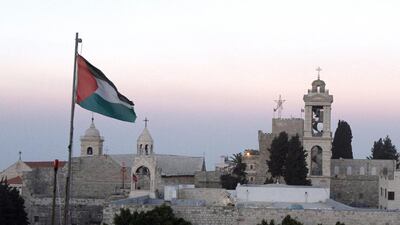With its tourism industry curtailed by the occupation of the West Bank, Bethlehem is looking beyond tourism as it tries to wrestle with severe economic challenges and rising youth unemployment.
In 2008, a joint venture between Palestine and France resulted in the development of the Bethlehem Multidisciplinary Industrial Park, a €20 million (Dh100.4m) project built entirely on Palestinian-controlled land in the West Bank.
But six years since the signing of the protocol agreement between the Palestinian president Mahmoud Abbas and his French counterpart Nicholas Sarkozy began the project, the BMIP is still being spoken about very much in the future tense. Much of the construction is now complete, but persuading companies to move in is the bigger challenge.
Samir Hazboun, the chairman of Bethlehem Chamber of Commerce and a director of BMIP, is optimistic that, when up and running, the park will encourage private investment from Europe that will bolster the funding that the Palestinian Authority already receives from the EU. But Mr Hazboun is well aware of the further challenges that will arise once the doors open.
While he predicts that the BMIP will create 1,500 local jobs, he is reluctant to give a deadline.
“We are working under tough rules and regulation. Movement, for example, is not easy and if you have a factory then you need to guarantee access for your trucks and other goods – and we don’t control our borders,” he says.
The movement issue is one that Palestinian exporters already wrestle with, as Palestinian trucks are allowed to use only a handful of checkpoints in the West Bank. A company in Bethlehem that wants to send a product to Jerusalem has to use Tarqumiya checkpoint near Hebron, 50 kilometres away, and then drive a further 60km to Jerusalem. This despite a distance of just 8km between the two cities.
“And [the company] has to pay the cost for that. Our competitive advantage is just not there,” says Mr Hazboun.
“This, while Israeli goods can enter [the West Bank] freely. There is no reciprocity in economic relations. Yes, we are importing from Israel and we have workers working in Israel but this is not free trade.”
And even as the latest round of peace talks between Israel and Palestine lies in tatters, Mr Hazboun stresses that improving the economic situation in Bethlehem and the wider West Bank is essential.
“If there is a political settlement then for sure the economic situation will improve, but if there isn’t, the trend of investment will decrease but it will not stop completely. The owners of the factories will not close in one day or one year. Life has to continue and we have to produce,” he said.
“It is not enough to have peace, you need to have economic cooperation too. This is what we trying to do.”
business@thenational.ae
Follow us on Twitter @Ind_Insights

